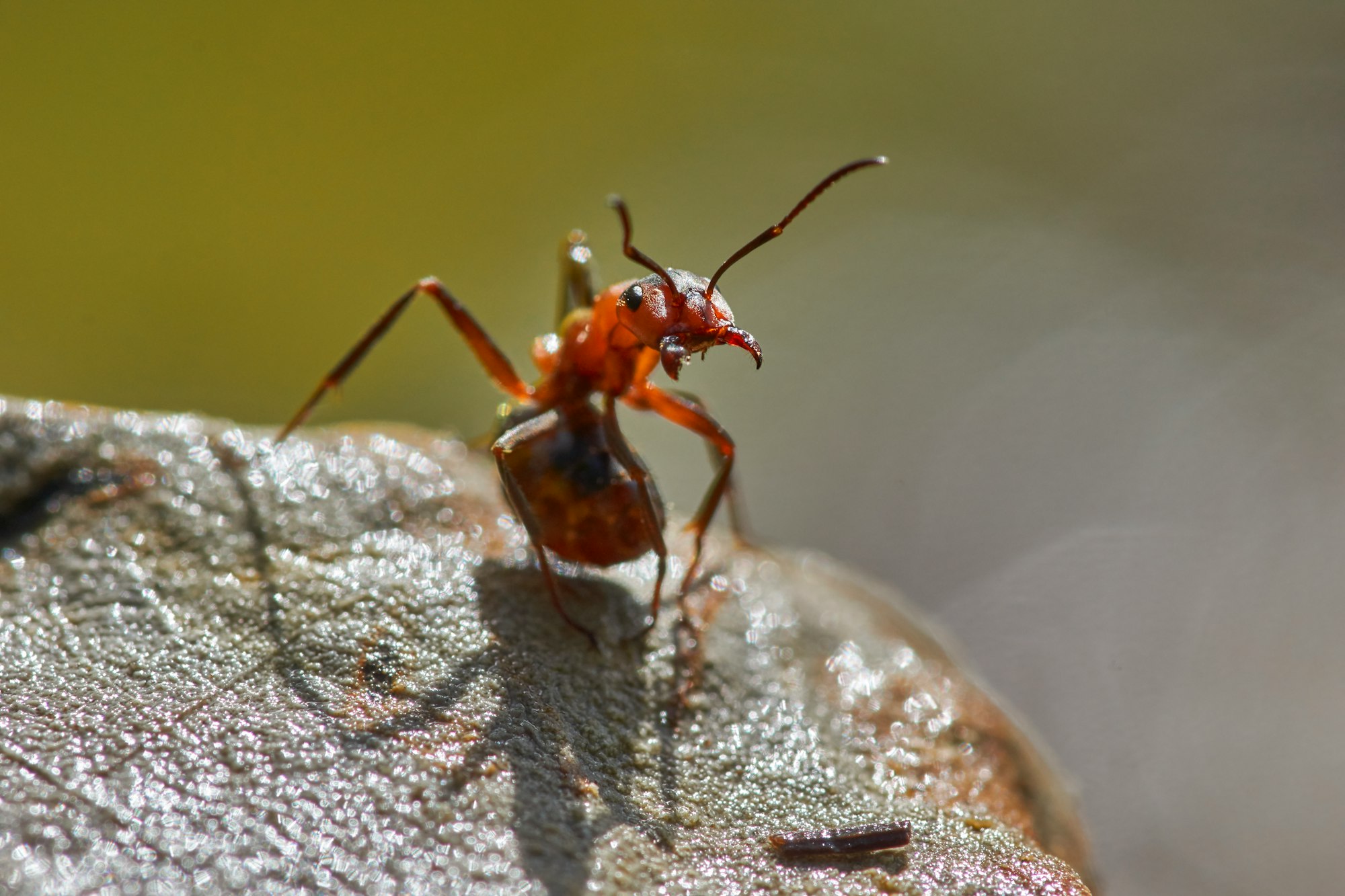Ant bites can be an annoying and painful experience for dogs. These tiny insects can cause discomfort, itching, swelling, and sometimes even allergic reactions in our furry friends. As a responsible pet owner, it's significant to understand the causes, treatment options, and prevention strategies when it comes to ant bites on dogs.
In this article, we will delve into the details of ant bites on dogs, helping you protect your canine companion from these pesky insects.

Understanding Ant Bites on Dogs
What attracts ants to dogs?
Ants are attracted to dogs due to various factors such as the scent of food, crumbs, or spills on the dog's fur. Additionally, dogs exploring outdoor environments may inadvertently disturb ant colonies, leading to defensive bites from the ants.
Common ant species that bite dogs
Several ant species are known to bite dogs, including fire ants, harvester ants, and red ants. These ants can inject formic acid or venom into the dog's skin, resulting in irritation and discomfort.
Identifying ant bites on dogs
Ant bites on dogs typically appear as small red bumps or welts on the skin. The bites may cause intense itching, leading the dog to scratch or lick the affected area excessively. In some cases, the bites may cause localized swelling and redness.
Symptoms of Ant Bites on Dogs
Itching and scratching: One of the primary symptoms of ant bites on dogs is itching. Dogs may scratch, bite, or lick the affected area to alleviate the discomfort caused by the bites.
Redness and swelling: Ant bites can cause redness and swelling around the bite site. The dog's skin may become inflamed, and the area might feel warm to the touch.
Allergic reactions: In some cases, dogs may exhibit allergic reactions to ant bites. Symptoms of an allergic reaction include hives, difficulty breathing, facial swelling, and weakness. If your dog shows any signs of an allergic reaction, seek immediate veterinary assistance.
Treatment for Ant Bites on Dogs
When it comes to treating ant bites on dogs, there are several steps you can take to alleviate discomfort and promote healing. Here's a guide on the treatment for ant bites on dogs:
1. Remove Your Dog from the Ant-Infested Area: If your dog has been bitten by ants, quickly move them away from the area to prevent further bites.
2. Inspect the Bites: Take a closer look at the ant bites on your dog. Note the location, number, and severity of the bites. This information can be helpful when discussing the situation with your veterinarian.
3. Clean the Bites: Gently clean the affected area with mild soap and lukewarm water. This helps remove any irritants and reduces the risk of infection. Pat the area dry with a clean towel.
4. Apply a Cold Compress: Use a cold compress or an ice pack wrapped in a cloth and apply it to the bites for about 10 minutes. This can help reduce swelling, relieve pain, and minimize itching.
5. Administer an Antihistamine: If your veterinarian has approved the use of antihistamines for your dog, follow their instructions on dosage and administration. Antihistamines can help reduce itching and swelling caused by ant bites. Never give your dog any medication without consulting your vet first.
6. Avoid Topical Treatments: It's generally best to avoid applying topical treatments, ointments, or creams to ant bites on dogs unless specifically recommended by your veterinarian. Some products may not be safe for dogs or could potentially worsen the situation.
7. Avoid Licking: Dogs may attempt to lick the affected area, which can further irritate the bites and delay healing. Consider using an Elizabethan collar (cone) or a bitter-tasting deterrent spray to prevent your dog from licking the bites.
8. Monitor for Signs of Infection: Keep a close eye on the ant bites for any signs of infection, such as increased redness, swelling, discharge, or the formation of abscesses. If you notice any of these symptoms, contact your veterinarian promptly.
9. Follow Veterinary Guidance: If the ant bites are severe, numerous, or causing significant discomfort to your dog, it's crucial to seek veterinary advice. Your veterinarian can provide specific guidance on treatment options and may prescribe medications, such as antibiotics or topical ointments, if necessary.
10. Prevent Future Bites: To avoid future ant bites, take steps to minimize your dog's exposure to ants. Keep them away from areas with ant activity, clear your yard of ant hills, and consider using pet-safe insect repellents or natural deterrents.
Home Remedies for Ant Bites on Dogs
Cold compress

Applying a cold compress or ice pack wrapped in a towel can help reduce itching and swelling caused by ant bites. Remember to wrap the compress to avoid direct contact with your dog's skin.
Baking soda paste
Mixing baking soda with water to create a paste and applying it to the affected area can help neutralize the acid from ant bites. This remedy can relieve itching and reduce inflammation.
Aloe vera gel
Aloe vera gel has soothing properties that can alleviate itching and promote healing. Apply a small amount of pure aloe vera gel to the ant bites on your dog, ensuring it does not contain any additional ingredients that could be harmful to dogs.

Preventing Ant Bites on Dogs
Preventing ant bites on good family dogs is crucial to ensure their safety and well-being. Here are some tips to help you prevent ant bites on your dog:
1. Avoid Ant-Infested Areas: Be mindful of areas where ants are prevalent, such as ant hills or areas with visible ant activity. Keep your dog away from these areas during walks or outdoor activities.
2. Maintain a Clean Yard: Regularly inspect your yard and eliminate ant colonies or ant hills. Keep your lawn well-trimmed, remove debris, and maintain cleanliness to discourage ants from nesting.
3. Use Pet-Safe Insecticides: If you're dealing with persistent ant problems in your yard, consult with a professional exterminator or choose pet-safe insecticides that specifically target ants. Follow the instructions carefully and ensure the products are safe for your dog.
4. Create Barriers: Consider creating physical barriers to keep ants away from areas where your dog spends time. Use natural deterrents like diatomaceous earth or plant-based repellents around your dog's living spaces.
5. Keep Food Areas Clean: Ants are attracted to food sources, so keep your dog's feeding area clean and free of spills or crumbs. Store pet food in sealed containers to prevent attracting ants into the house.
6. Check Sleeping Areas: Inspect your dog's sleeping areas regularly, especially if they spend time outdoors or in areas prone to ants. Make sure there are no ant trails or colonies near their resting spots.
7. Groom Your Dog: Regular grooming helps you identify any ants or other insects that may have come into contact with your dog's fur. Brush your dog's coat and check for signs of ants or ant bites. Get useful tips about how to groom a dog.

8. Use Pet-Safe Insect Repellents: Consider using pet-safe insect repellents, such as sprays or GPS dog collars, to provide an additional layer of protection against ants and other biting insects. Make sure the repellents are specifically formulated for use on dogs and follow the instructions provided.
9. Supervise Outdoor Activities: When your dog is outside, keep a close eye on them to ensure they don't venture into areas with ant activity. If you notice ants gathering, quickly redirect your dog to a safer area.
10. Consult Your Veterinarian: If you live in an area with a high ants population or if your dog has a history of severe reactions to ant bites, consult your veterinarian. They can provide additional advice, recommend preventive measures, or suggest specific products to protect your dog.
By following these preventive measures, you can significantly reduce the risk of ant bites on your dog and help keep them safe and comfortable.
Tips for Handling Ant Bites on Dogs
If your dog gets bitten by ants, it's essential to provide immediate care to alleviate their discomfort and prevent any potential complications. Here are some tips for handling ant bites on dogs:
1. Move Your Dog Away from the Ants: If your dog gets bitten by ants, move them away from the ant-infested area to prevent further bites.
2. Observe for Allergic Reactions: Watch your dog closely for signs of an allergic reaction. These may include excessive swelling, difficulty breathing, hives, or lethargy. If you notice any of these symptoms, seek veterinary attention immediately.
3. Clean the Affected Area: Gently clean the area where your dog was bitten with mild soap and water. Pat it dry with a clean towel.
4. Apply Cold Compress: If there's swelling, apply a cold compress wrapped in a cloth or use an ice pack (make sure it's not too cold) to the affected area for about 10 minutes. This can help reduce swelling and alleviate pain.
5. Use an Antihistamine: You can give your dog an antihistamine as long as it's approved by your veterinarian. Antihistamines can help reduce itching and swelling. Never give your dog any medication without consulting your vet first.
6. Avoid Home Remedies: Some home remedies, such as applying vinegar, baking soda, or essential oils, may not be safe for dogs and could potentially worsen the situation. Stick to veterinarian-approved treatments.
7. Prevent Licking: Dogs may try to lick the affected area, but this can irritate the bites further. Consider using an Elizabethan collar (cone) to prevent licking until the bites heal.
8. Monitor the Bites: Keep an eye on the bites to ensure they are healing and not becoming infected. If you notice signs of infection (redness, discharge, or increased swelling), consult your vet.
9. Consult Your Veterinarian: If the ant bites are severe, numerous, or causing your dog significant distress, it's best to consult your veterinarian for proper assessment and treatment.
10. Prevent Future Bites: To prevent future ant bites, keep your dog away from areas with ant activity, especially ant hills. Also, consider using pet-safe insect repellents or natural deterrents to discourage ants from approaching your dog.

Remember, every dog's reaction to ant bites can vary, so it's always wise to err on the side of caution and seek professional veterinary advice when needed. Your veterinarian can provide tailored guidance and recommend the best course of action for your dog's specific situation.
When to Consult a Veterinarian
Severe allergic reactions: If your dog shows signs of severe allergies, such as difficulty breathing, facial swelling, or collapse, seek immediate veterinary care. Allergic reactions can be life-threatening if left untreated.
Persistent symptoms: If the symptoms of ant bites on your dog persist or worsen despite home remedies or over-the-counter treatments, consult your veterinarian for a proper diagnosis and further treatment options.
Secondary infections: Ant bites that become infected may require veterinary intervention. If you notice signs of infection, such as increased redness, swelling, discharge, or foul odor, contact your veterinarian for guidance.
FAQs
- Can ant bites on dogs be dangerous?
While most ant bites on dogs are not dangerous, severe allergic reactions or secondary infections can occur. It's essential to monitor your dog's symptoms and seek veterinary care if necessary.
- How long does ant bites on dogs last?
The duration of ant bites on dogs can vary. In most cases, the bites heal within a few days to a week. However, persistent or worsening symptoms should be evaluated by a veterinarian.
- Can I use human insect repellent on my dog?
No, it's not recommended to use human insect repellents on dogs. Some ingredients can be toxic to dogs. Consult with your veterinarian for safe and effective pet-friendly repellent options.
- Are certain dog breeds more susceptible to ant bites?
All dog breeds are susceptible to ant bites. However, dogs with thin or sensitive skin may experience more pronounced reactions to ant bites.
- Can ant bites on dogs lead to infections?
Yes, ant bites can lead to secondary infections if the skin is broken or if the bites are scratched excessively. Keep an eye on the affected area and consult your veterinarian if you suspect an infection.
Conclusion
Ant bites on dogs can cause discomfort and irritation to our beloved pets. By understanding the causes, symptoms, treatment options, and prevention strategies, you can better protect your dog from ant bites. Remember to keep your dog's environment clean, eliminate ant colonies, and seek veterinary assistance if needed. With proper care and prompt action, you can help your furry friend recover from ant bites and prevent future occurrences.